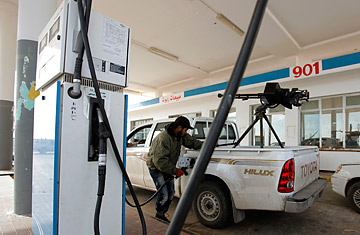
A Libyan rebel refuels his vehicle at a gas station on the main road leading to the eastern town of Ras Lanouf, Libya.
Just two weeks ago, Libya's oil chief boasted to reporters in Tripoli that the country's huge energy business could ride out the conflict and quickly recover. It would effectively ignore the fact that energy installations were now split between two warring halves of the country. "Integrated and unified," is how Shokri Ghanem, head of the Libyan National Oil Corporation described the energy sector, claiming that he was in close communications with staff at the vast oil fields in rebel-held eastern Libya.
That was then. Now, the oil and gas industry — on which Muammar Gaddafi depends for his regime's survival — teeters between paralysis and chaos, and energy analysts warn that it will take some time to recuperate. Ghanem's NOC, which generates more than 90% of Libya's income, is under international sanctions. New E.U. measures announced Thursday banned member states from purchasing any Libyan oil or gas.
Thousands of foreign oil executives and workers from companies such as Occidental, BP and Total, have fled the violence, leaving their Libyan staff to keep up basic maintenance as they wait out the power struggle. At least one of the oil companies under Ghanem's control, Arabian Gulf Oil, has broken with the parent corporation and pledged its output to a new rebel-run oil authority, which has yet to do a dollar's worth of business.
Even if the Libyan war ended tomorrow, energy analysts estimate that the country's production has now dwindled to between 200,000 and 300,000 barrels a day, compared with the 1.6 million pumped before the revolt. The more important statistic, however, is a big zero: That is the amount of oil and gas Libya currently exports, and by extension, the amount of hard currency Gaddafi is currently earning. "It would be very difficult, no, impossible, to export oil from Libya now," says Cliff Kupchan, director of the Eurasia Group in Washington. "And it's hard to see, in any near-term period, them exporting much oil."
One glance at Libya's oil and gas map shows why: Libya's energy wealth is more or less divided down the middle of the country, with huge unexplored areas of the Sahara Desert in between. About two-thirds of the country's mammoth oil reserves — the biggest in Africa — lie in what's now rebel-held territory. The rebels also control key oil-export terminals in the eastern ports of Zuteina and Tobruk, where hundreds of thousands of barrels now sit in storage tanks. Across the country, Gaddafi's regime controls the natural-gas pipeline to Italy, near the Tunisian border, as well as Tripoli's big oil-export terminal, and Libya's two biggest oil refineries, at Ras Lanuf (which Gaddafi seized back from the rebels just two weeks ago) and Zawiyah.
That neat East-West division of the natural spoils could allow for a long, bloody war, since each side has the potential to generate massive income for many years to come by tapping into their separate oil and gas fields, pipelines, refineries, and terminals — that is, so long as they can find customers. While the rebels have no obvious source of revenue at the moment, Gaddafi is believed to be sitting on immense wealth, which he could use for some time to keep western Libya running, despite the fact that his assets have been frozen elsewhere; earlier this week the IMF estimated that Gaddafi has about $3 billion worth of gold in reserve, much of which is believed to be inside Libya.
But just as Gaddafi's regime is wholly dependent on oil and gas revenues to run the country, the rebels would be in a similar position if they postpone their quest to take over all of Libya and set up their own state in the east. Anticipating that, rebel leaders on Tuesday established their own oil company, and announced that all revenues from oil could be paid directly into the Central Bank of Benghazi — creating some basic infrastructure for a separate state, in the event that the current conflict ends in a stalemate and de facto partition of Libya. "If you could bring security to both ends of the country, and maybe abandon the middle, you could have plenty of oil and gas activity in both East and West," says William Ramsay, a former U.S. State Dept. official who now heads the energy program at the French Institute for International Relations in Paris. Selling the bulk of Libya's oil, he says, would require the country's biggest customers like the E.U. "to give credibility to eastern authorities."
Big Oil's exploration and production contracts with Tripoli have many more years to run, however; BP, for example, was set to begin drilling this year offshore, in the Gulf of Sidra. As yet it is unclear what will happen to those contracts once the war ends — especially if Gaddafi manages to remain in power in Tripoli. The Libyan leader this week threatened to shun oil companies whose countries are bombing Libya. And that would affect some of the global oil market's biggest players, including BP, Total and Marathon Oil.
